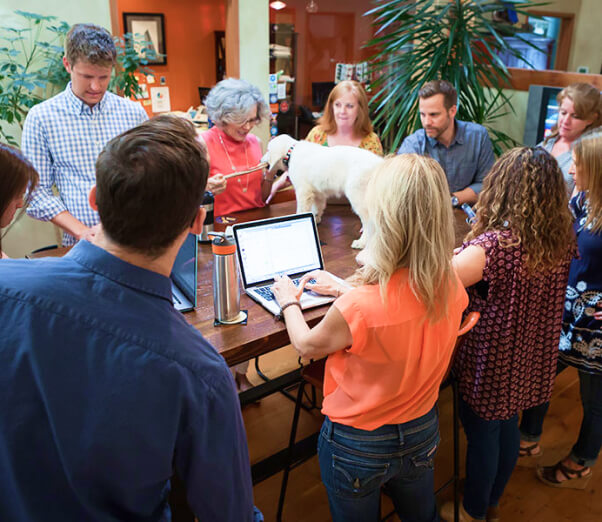Intuition in Business: How to Recognize Your Internal Compass
This is the second of three guest blogs by international spiritual medium and bestselling author Rebecca Rosen.
Once we open up to the advantages of combining our intellect and intuition, the next step is learning how to recognize our intuition and choosing to trust it. This takes practice, especially if we have lost touch with these innate internal cues and bodily sensations through simply ignoring or discounting these thoughts and feelings.
While we all have intuition, it is subtle, and requires our attention. Think of it as an internal compass, pointing us in the right direction and appearing as quiet whispers in our mind’s voice. To access this data and accelerate our own growth, we must first become self-aware. This requires checking in with ourselves and taking note of what we are thinking and feeling on a regular basis. This awareness is what allows us to fully identify our intuition so that we can begin to act on it.
Distinguish between mental and intuitive thoughts
To build self-awareness, we must first learn how to differentiate between mind thoughts and intuition. The easiest way to explain the difference is that a mind thought is a trailed thought. It’s complicated storytelling that leads you from one point to another in your mind. In contrast, intuitive hits and thoughts happen out of the blue and are generally clear and concise.
For example: you may get a thought, out of nowhere, to call a former colleague. The idea appears even though there was no trace of it in your previous thoughts. Then a few hours later, you run into that colleague at a restaurant, who shares that she had been meaning to reach out as she may have an opportunity for you. That’s when you have an “AHA!” moment. It was your intuition tuning into this encounter and potential opportunity ahead of time, giving you the heads up.
Intuition is a practice. If you haven’t paid attention to your thoughts and how they come to you, this may seem like a hard distinction to make. But when we do start to track where our thoughts are coming from and how we reached certain conclusions, we begin to recognize the differences. It becomes easier to differentiate between the two the more we practice.
Pay attention to your feelings
In addition to tracking differently in our mind, intuitive thoughts and mind thoughts feel different. We’re all born with a “spidey sense” and we can consider our feelings indicators of our intuition. Therefore, it’s fair to say that our feelings are our guidance. Feelings don’t lie, they simply are stating the truth at that moment. However, our mind thoughts tend to exaggerate, fabricate, and distort the truth at times. So, when in doubt, trust your feelings as your guide.
Building our self-awareness does not only apply to our mind but also our body. One tool that incorporates a mind/body/spirit approach to decisions is a practice that I refer to as the Trifecta Check. This is where we take a time out to check in with our head, heart and gut, feeling into what’s coming up for us with regard to a particular situation, question or person.
Start by tuning into your mind and asking what it thinks, trusting the very first thought that comes to you; Next, drop into the center of your chest and ask what your heart feels, paying close attention to what feelings arise; finally move your awareness to your stomach and “gut check” what you’re feeling. What causes your stomach to be in a knot or your chest to tighten, which generally equates to a “no?” What makes you feel relaxed, light and expanded, indicating a “yes”? Mind thoughts often cause us to feel doubt, fear, or anxiety and to second-guess the information we’ve received. In contrast, when intuition strikes, it will feel simple and true. Instead of uncertainty, we feel a certain knowing, often accompanied by a peaceful, clear and expansive feeling.
Be willing to trust your guidance
When you choose to trust your intuition, you are running on instinct. We don’t have the proof that our intuition is correct until we choose to trust it. This can feel risky, since our intellect tells us to look for the signs that we are right before we choose to act. Trusting our intuition requires us to act before we have that proof. But when we put our intuition to the test, having confidence in the self-awareness that we’ve built, the results will speak for themselves.
For instance, the intuitive hit you received to call a former colleague might lead to an unexpected job opportunity or a business partnership. While you may not always be clear on the reason you’re receiving the intuitive guidance, seeing the outcomes shows us that we don’t always have to. We just need to get more comfortable following through on those instincts or intuitive hits. The more you can build a foundation to first recognize your intuition, and then trust it, the more powerful it will become in guiding you to the right decisions.
Follow in the steps of the world’s top business leaders
Well-known business leaders throughout history have harnessed the power of their intuition, relying on it when making tough business decisions. Richard Branson once said, “I rely far more on gut instinct than researching huge amounts of statistics.” Similarly, Steve Jobs commented on the impact intuition had on his work, saying “Intuition is a very powerful thing, more powerful than intellect, in my opinion.”
Relying on spreadsheets and numbers alone only gets you so far. From an outsider’s perspective, cutting edge business decisions by the likes of Richard Branson and Steve Jobs may not have seemed logical or even possible on paper at the time of their conception. But their accomplishments show that learning to recognize and trust their intuition — and combining it with their intellect and experience — has led to better decision-making and greater success.
You likely know of leaders in your own field who have relied on their instincts and intuition to innovate and make an impact. To do that, we must first know ourselves so that we can trust ourselves. This is important, because the decisions we make from intuition usually feel good and right to us before they may make sense to others.
Get started on the path of intuition
Start today by finding moments to pay attention to your thoughts, feelings and what you feel guided to act on. Think about what you may be second guessing and feeling hesitancy toward versus those actions that you are excited, confident or at peace about taking.
You can begin with small changes, like evaluating how you feel before you send an email or make an important phone call. Do you feel resistance in doing the activity or is your body telling you that you feel confident in completing it? Observe how paying attention to those small indications lead to real-life implications. Perhaps when you felt hesitancy and followed your guidance to wait, you later realized that there was missing information, that you forgot an important aspect, or you learned something new that would create changes.
While these may seem like small adjustments to your day, they can quickly add up to meaningful decisions that help you accomplish your goals. The more we listen to and trust our intuition through these simple steps, that voice in our ear becomes louder, clearer and more effective at guiding us to our desired outcomes.
Rebecca is well-known for her large audience readings, where she brings people messages from their departed loved ones. Enter here for a chance to win a ticket to her live event in Denver this spring.



